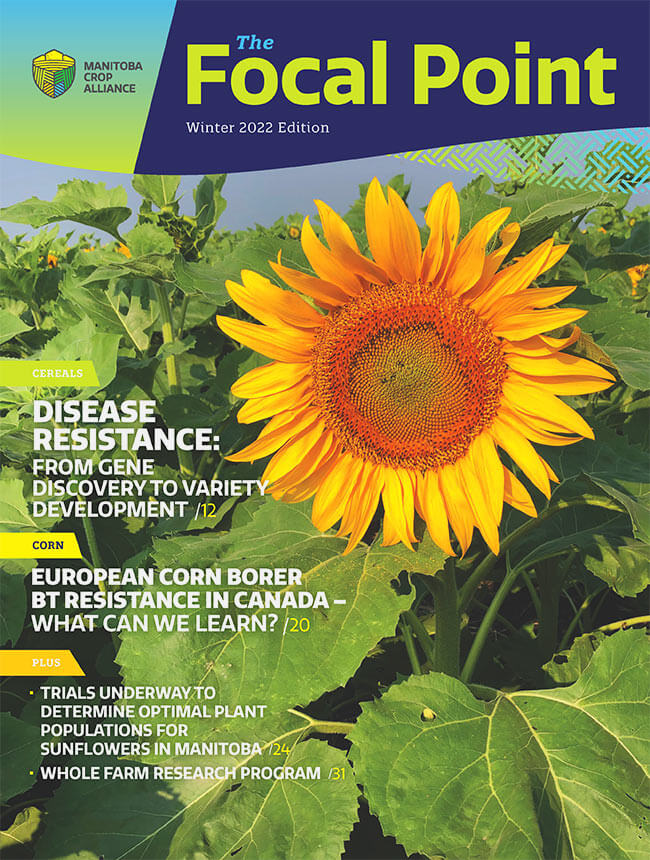Manitoba Crop Alliance Elects Officer Positions For 2022/23
FOR IMMEDIATE RELEASE
Wednesday, March 16,2022 (Carman, MB) – Manitoba Crop Alliance is proud to introduce its new board executive for the upcoming year.
Last week, Robert Misko was elected as Chair, Jonothan Hodson was elected as Vice-Chair and Warren McCutcheon was elected as Secretary.
“It is an honour to be elected as chair for the MCA board of directors. I look forward to working with the new and existing directors for the coming year,” says Misko.
“As a representative of the farming community, I believe it is important we build strong connections and work together towards the same goal: to continuously improve the competitiveness and profitability of spring and winter wheat, barley, corn, sunflower and flax for Manitoba farmers.”
Misko farms 6,500 acres with his wife and children near Roblin. Misko’s previous and current board experience includes Reeve for the Rural Municipality (RM) of Hillsburg, Association of Manitoba Municipalities director for the Parkland Region, delegate for Manitoba Pool and Agricore, director with one of MCA’s founding organizations(Manitoba Wheat and Barley Growers Association), director for Cereals Canada, and director and research representative for Western Grains Research Foundation. He is currently Head of Council for the RM of Roblin and sits on the Parkland Crop Diversification Foundation Board.
Hodson is a fifth-generation farmer from Lenore with a keen interest in on-farm research. His mixed farm features a wide variety of crops in any given year – including spring wheat, canola, soybeans, grain corn, barley, yellow peas and some forage crops – as well as a Black Angus cow/calf operation. Hodson previously served as a director for one of MCA’s founding organizations(Manitoba Corn Growers Association), as well as the Manitoba Angus Association, and he is currently a director for the Valleyview Co-op.
“I’m extremely excited to have the opportunity to serve as MCA’s vice-chair,” says Hodson. “MCA is an organization focused on research, with a goal of creating sustainability gains for farmers throughout Manitoba.”
McCutcheon farms with his wife, Meghan, and their two girls near the Carman/Homewood area. He is the third generation on their family farm and alongside his dad, Shawn, grows corn, edible beans, seed soybeans, wheat and canola across 3,000 acres. McCutcheon has previous board experience with one of MCA’s founding organizations (Manitoba Corn Growers Association), as well as the Carman Golf and Curling Club. He also spent 10 years competing at the highest levels of hockey, where he developed the leadership skills he now brings to MCA’s board.
“I am extremely passionate about agriculture and believe we have many challenges facing our industry,” says McCutcheon. “I got involved with MCA to help navigate these issues, so our farms can continue to be successful. I also want to ensure the dollars being contributed by farmers are returning the highest possible value to them.”
For more information about MCA’s Board and Crop Committees, please visit mbcropalliance.ca/about/board-crop-committees.
-30-
About Manitoba Crop Alliance:
Manitoba Crop Alliance is a non-profit organization established August 1, 2020 representing over 9,000 farmer-members. Manitoba Crop Alliance puts their farmer-members first and strives to continuously improve the competitiveness and profitability of all crops represented by the organization by focusing on four main areas: research, agronomy, market access and development, and communications. It is through investment in these key areas that Manitoba Crop Alliance can ensure wheat, barley, corn, sunflower and flax are sustainable production choices for Manitoba farmers. For more information, visit mbcropalliance.ca.
For more information, please contact:
Pam de Rocquigny
Chief Executive Officer
204-745-6661
pam@mbcropalliance.ca












